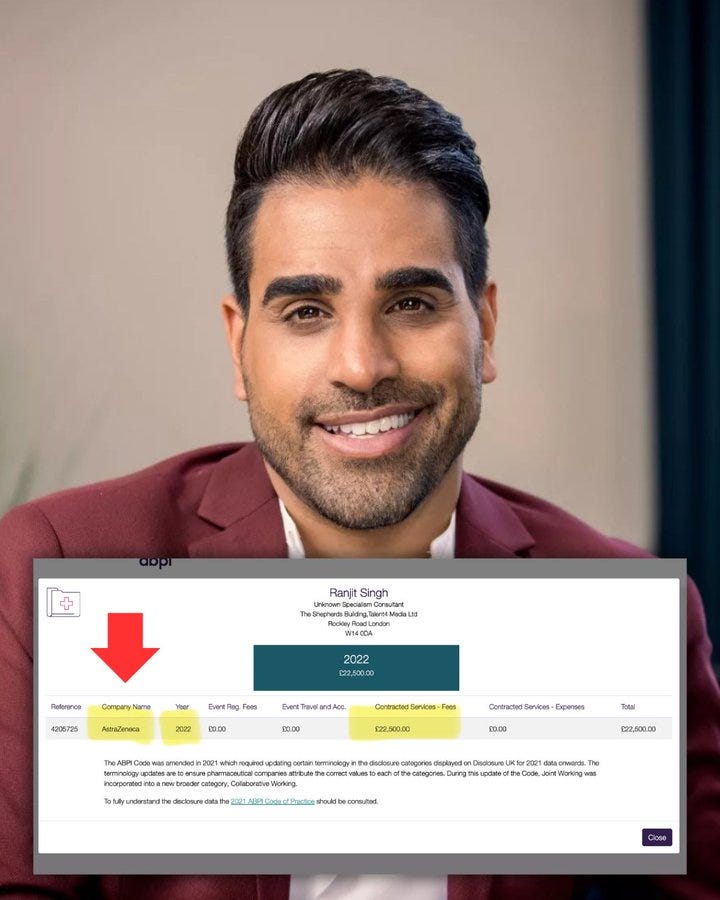Big Pharma Kickbacks to UK Doctors and TV Presenters Revealed
AstraZeneca paid TV presenter Dr. Ranjit Singh £22,500.00 for unspecified “Contracted Services - Fees” in 2022.
Recent investigative efforts by alternative journalists and, surprisingly, a pharmaceutical organization, have brought to light a concerning pattern of financial relationships between pharmaceutical companies, such as AstraZeneca and Pfizer, and UK-based doctors who have been vocal proponents of COVID-19 vaccines. These revelations raise significant questions about the impartiality of medical advice offered to the public during the pandemic.
The Case of Dr. Ranjit Singh
A striking instance involves Dr. Ranjit Singh, a well-known UK doctor and television presenter. It has been reported that in 2022, AstraZeneca paid Dr. Singh £22,500.00 for unspecified “Contracted Services - Fees.”
This payment is problematic because Dr. Singh has been a staunch advocate for mass COVID vaccination, often appearing on major news programs to promote the safety and efficacy of vaccines like AstraZeneca's. His financial ties to the company were never disclosed during these appearances, suggesting a conflict of interest.
Broader Patterns of Payments
The issue extends beyond Dr. Singh. Documents and investigative reports suggest that there is a widespread pattern of financial transactions from big pharma to numerous UK doctors and television presenters. These doctors have similarly advocated for the safety and efficacy of COVID-19 vaccines on various public platforms.
A massive database of Big Pharma payments, Disclosure UK, is a key part of a European initiative aimed at enhancing transparency in the relationships between pharmaceutical companies and the health professionals and organizations they collaborate with, such as doctors, nurses, and pharmacists. Disclosure UK is maintained by the Association of the British Pharmaceutical Industry (ABPI). They state as their goal:
“We want the UK to be the best place in the world to research, develop and use the medicines and vaccines of the future.”
The pharmaceutical payout data can be searched at the Disclosure UK website here:
https://search.disclosureuk.org.uk/
A comprehensive review of 200+ pages revealing recipients of pharmaceutical payments indicates that this might just be scratching the surface. In the UK, it is not mandatory for doctors to declare these payments, which means that the full extent of these financial relationships might be even more extensive than currently known.
Public Reaction and Ethical Concerns
This situation has sparked outrage and concern among the public and within the medical community. Critics argue that such undisclosed payments may influence the medical opinions provided to the public, potentially undermining trust in healthcare professionals and public health initiatives.
The case of David Cartland, who spoke out against these practices, illustrates the potential repercussions for whistleblowers. Reports suggest efforts to discredit and silence voices like Cartland's, further complicating the ethical landscape surrounding medical transparency and trust.
The discovery of undisclosed payments from pharmaceutical companies to doctors raises profound ethical questions about the influence of money on medical advice during a global health crisis. As more information comes to light, there is a growing call for stricter ethics and transparency to ensure that healthcare guidance remains unbiased and in the best interest of public health.





Great article and I’m sure there are many more quite like this one both in the states and Canada .